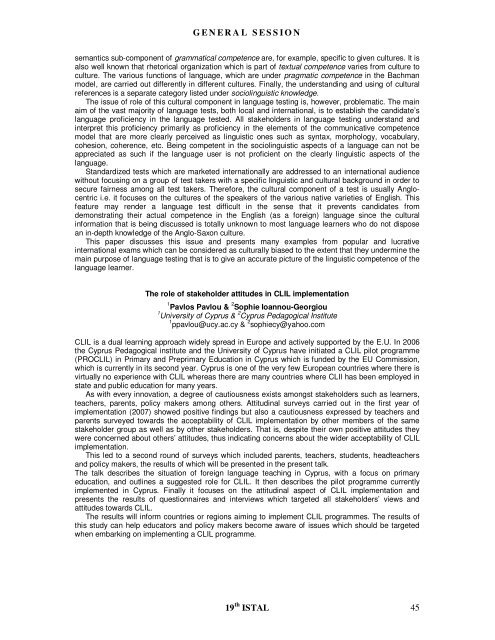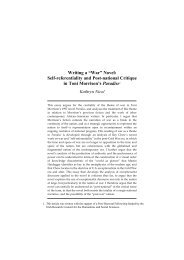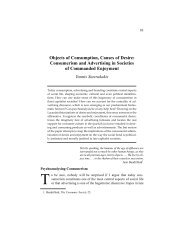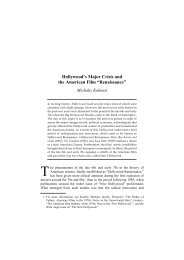19 International Symposium on Theoretical and Applied Linguistics ...
19 International Symposium on Theoretical and Applied Linguistics ...
19 International Symposium on Theoretical and Applied Linguistics ...
Create successful ePaper yourself
Turn your PDF publications into a flip-book with our unique Google optimized e-Paper software.
G E N E R A L S E S S I O N<br />
semantics sub-comp<strong>on</strong>ent of grammatical competence are, for example, specific to given cultures. It is<br />
also well known that rhetorical organizati<strong>on</strong> which is part of textual competence varies from culture to<br />
culture. The various functi<strong>on</strong>s of language, which are under pragmatic competence in the Bachman<br />
model, are carried out differently in different cultures. Finally, the underst<strong>and</strong>ing <strong>and</strong> using of cultural<br />
references is a separate category listed under sociolinguistic knowledge.<br />
The issue of role of this cultural comp<strong>on</strong>ent in language testing is, however, problematic. The main<br />
aim of the vast majority of language tests, both local <strong>and</strong> internati<strong>on</strong>al, is to establish the c<strong>and</strong>idate’s<br />
language proficiency in the language tested. All stakeholders in language testing underst<strong>and</strong> <strong>and</strong><br />
interpret this proficiency primarily as proficiency in the elements of the communicative competence<br />
model that are more clearly perceived as linguistic <strong>on</strong>es such as syntax, morphology, vocabulary,<br />
cohesi<strong>on</strong>, coherence, etc. Being competent in the sociolinguistic aspects of a language can not be<br />
appreciated as such if the language user is not proficient <strong>on</strong> the clearly linguistic aspects of the<br />
language.<br />
St<strong>and</strong>ardized tests which are marketed internati<strong>on</strong>ally are addressed to an internati<strong>on</strong>al audience<br />
without focusing <strong>on</strong> a group of test takers with a specific linguistic <strong>and</strong> cultural background in order to<br />
secure fairness am<strong>on</strong>g all test takers. Therefore, the cultural comp<strong>on</strong>ent of a test is usually Anglocentric<br />
i.e. it focuses <strong>on</strong> the cultures of the speakers of the various native varieties of English. This<br />
feature may render a language test difficult in the sense that it prevents c<strong>and</strong>idates from<br />
dem<strong>on</strong>strating their actual competence in the English (as a foreign) language since the cultural<br />
informati<strong>on</strong> that is being discussed is totally unknown to most language learners who do not dispose<br />
an in-depth knowledge of the Anglo-Sax<strong>on</strong> culture.<br />
This paper discusses this issue <strong>and</strong> presents many examples from popular <strong>and</strong> lucrative<br />
internati<strong>on</strong>al exams which can be c<strong>on</strong>sidered as culturally biased to the extent that they undermine the<br />
main purpose of language testing that is to give an accurate picture of the linguistic competence of the<br />
language learner.<br />
The role of stakeholder attitudes in CLIL implementati<strong>on</strong><br />
1 Pavlos Pavlou & 2 Sophie Ioannou-Georgiou<br />
1 University of Cyprus & 2 Cyprus Pedagogical Institute<br />
1 ppavlou@ucy.ac.cy & 2 sophiecy@yahoo.com<br />
CLIL is a dual learning approach widely spread in Europe <strong>and</strong> actively supported by the E.U. In 2006<br />
the Cyprus Pedagogical institute <strong>and</strong> the University of Cyprus have initiated a CLIL pilot programme<br />
(PROCLIL) in Primary <strong>and</strong> Preprimary Educati<strong>on</strong> in Cyprus which is funded by the EU Commissi<strong>on</strong>,<br />
which is currently in its sec<strong>on</strong>d year. Cyprus is <strong>on</strong>e of the very few European countries where there is<br />
virtually no experience with CLIL whereas there are many countries where CLIl has been employed in<br />
state <strong>and</strong> public educati<strong>on</strong> for many years.<br />
As with every innovati<strong>on</strong>, a degree of cautiousness exists am<strong>on</strong>gst stakeholders such as learners,<br />
teachers, parents, policy makers am<strong>on</strong>g others. Attitudinal surveys carried out in the first year of<br />
implementati<strong>on</strong> (2007) showed positive findings but also a cautiousness expressed by teachers <strong>and</strong><br />
parents surveyed towards the acceptability of CLIL implementati<strong>on</strong> by other members of the same<br />
stakeholder group as well as by other stakeholders. That is, despite their own positive attitudes they<br />
were c<strong>on</strong>cerned about others’ attitudes, thus indicating c<strong>on</strong>cerns about the wider acceptability of CLIL<br />
implementati<strong>on</strong>.<br />
This led to a sec<strong>on</strong>d round of surveys which included parents, teachers, students, headteachers<br />
<strong>and</strong> policy makers, the results of which will be presented in the present talk.<br />
The talk describes the situati<strong>on</strong> of foreign language teaching in Cyprus, with a focus <strong>on</strong> primary<br />
educati<strong>on</strong>, <strong>and</strong> outlines a suggested role for CLIL. It then describes the pilot programme currently<br />
implemented in Cyprus. Finally it focuses <strong>on</strong> the attitudinal aspect of CLIL implementati<strong>on</strong> <strong>and</strong><br />
presents the results of questi<strong>on</strong>naires <strong>and</strong> interviews which targeted all stakeholders’ views <strong>and</strong><br />
attitudes towards CLIL.<br />
The results will inform countries or regi<strong>on</strong>s aiming to implement CLIL programmes. The results of<br />
this study can help educators <strong>and</strong> policy makers become aware of issues which should be targeted<br />
when embarking <strong>on</strong> implementing a CLIL programme.<br />
<str<strong>on</strong>g>19</str<strong>on</strong>g> th ISTAL 45






